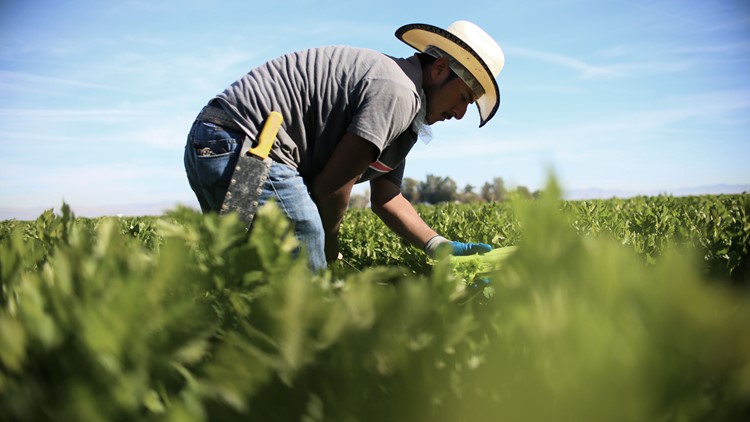CALIFORNIA, USA — California lawmakers are looking to protect one of the state’s most valuable workforces with a new COVID-19 relief package.
Gov. Gavin Newsom signed a farmworker relief package this week, which promises farmworkers stricter enforcement of health guidelines, paid sick leave for COVID-19, and prioritizes farmworkers for both PPE and testing, among other things.
The package, penned by state Assembly members Robert Rivas (D-Hollister), Eduardo Garcia (D-Coachella) and Lorena Gonzalez (D-San Diego), is the nation’s first legislative package centered on COVID-19 protections for agricultural workers.
Included in the package were several initiatives undertaken by Newsom at the urging of lawmakers, such as the Housing for the Harvest program, an emergency housing program modeled after one created by the Grower-Shipper Association to provide housing to farmworkers exposed to or diagnosed with COVID-19.
“California’s farmworkers have been a lifeline during the COVID-19 pandemic and risked their lives daily to make sure we could put food on the table,” a Rivas release quoted United Food and Commercial Workers Local 5 Agricultural Division Director Pete Maturino as saying.
Legislators from both sides of the aisle voted for the bill package, which was passed in August.
Rivas, recently named chair of the Assembly Agriculture Committee, said the relief package is intended to protect a group of vulnerable workers overlooked in the federal government’s coronavirus response.
“The number of undocumented farmworkers we have in our state…they contribute every single day to our economy,” Rivas said. “Even though they contribute to our economy, pay taxes, they aren’t eligible for benefits, for the stimulus monies made available to so many people impacted by COVID-19.”
Rivas pointed to outbreaks of COVID-19 at meat processing plants across the country that had slowed or shuttered business, resulting in a scarcity of certain meat products for a time. By passing protections for farmworkers, he said, legislators were, in turn, protecting the food supply chain.
Rivas said the pandemic has revealed extreme vulnerabilities in the agricultural industry.
“For me, what was heartbreaking, is these are families,” said Rivas. “These are children. They have had to endure a lot of challenges – contracting the virus, having to still go out and work. They have to earn a paycheck. That’s why we’ve seen these concentrated outbreaks within the farmworker community.”
Recent data out of Monterey County shows Latinos account for approximately 90% of COVID-19 cases but only 61% of the total population. Most diagnosed with the virus live in the two poorest, most crowded ZIP codes in Salinas, which are primarily farmworking communities.
A report released this summer out of the California Institute of Rural Studies showed Monterey County farmworkers are three times more likely to catch COVID-19 than workers in any other industry. Similarly, a University of California, Los Angeles study demonstrated that Latino deaths have quintupled since May because of their status as “unsung essential workers,” including agricultural workers.
Rivas believes the bill that will have the most impact is Assembly Bill 2043, the Agricultural Workplace Health and Safety Act. Under the bill, Cal/OSHA will be required to track and report workplace investigations publicly on its site. It goes into effect immediately, and Rivas said it could help slow the spread of the virus.
“Governor Newsom is right when he says data is absolutely key in public policy to stopping this pandemic,” said Rivas. “How can we minimize outbreaks and risk if we don’t know what’s happening at the worksite? I hope this will result in our ability to use these reports to address potential problems statewide so we no longer have these hotspots.”
AB 2165, which expands electronic filing to all state trial courts, will go into effect Jan. 1.
California COVID-19 Farmworker Relief Package
- AB 2043: Agricultural Workplace Health & Safety
- Ensures enforcement by Cal/OSHA of its COVID-19 guidance, funds a targeted bilingual outreach campaign to educate agricultural workers on Cal/OSHA guidance, as well as COVID-19-related paid sick leave and workers compensation benefits, and directs Cal/OSHA to track and report workplace investigations related to the agricultural industry.
- AB 2165: E-Filing and Rural Access to Justice Act
- Expands the availability of electronic filing to all state trial courts, given that access to courthouses is a problem in many farmworker and other rural communities.
- Request for Temporary COVID-19 Housing for Agricultural Workers
- After formal requests in March and April, followed by a $25 million budget request in May, to expand the administration’s Project Roomkey and Homekey programs, Newsom announced the Housing for the Harvest program in July to provide safe, temporary isolation spaces for sick or at-risk agricultural workers.
- Request for Prioritization of Agricultural Workers for PPE and COVID-19 Testing
- After formal requests in March and April, Newsom announced in May that his administration would be ramping-up testing availability for rural and other underserved communities and again in July that both testing and PPE access would be improved for agricultural workers.
- AB 2164: Telehealth for Rural and Community Health Centers Act
- Expands telehealth services for rural and community health centers, to the benefit of farmworker and other marginalized groups that have difficulty accessing medical care.
Kate Cimini is a journalist for The Salinas Californian. This article is part of The California Divide, a collaboration among newsrooms examining income inequity and economic survival in California.



